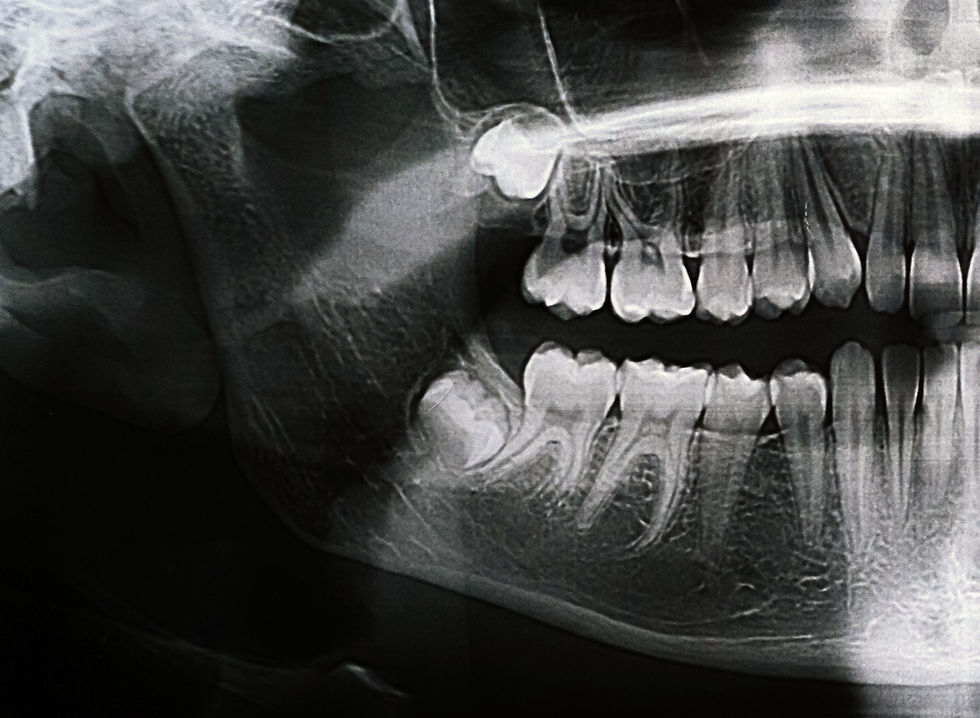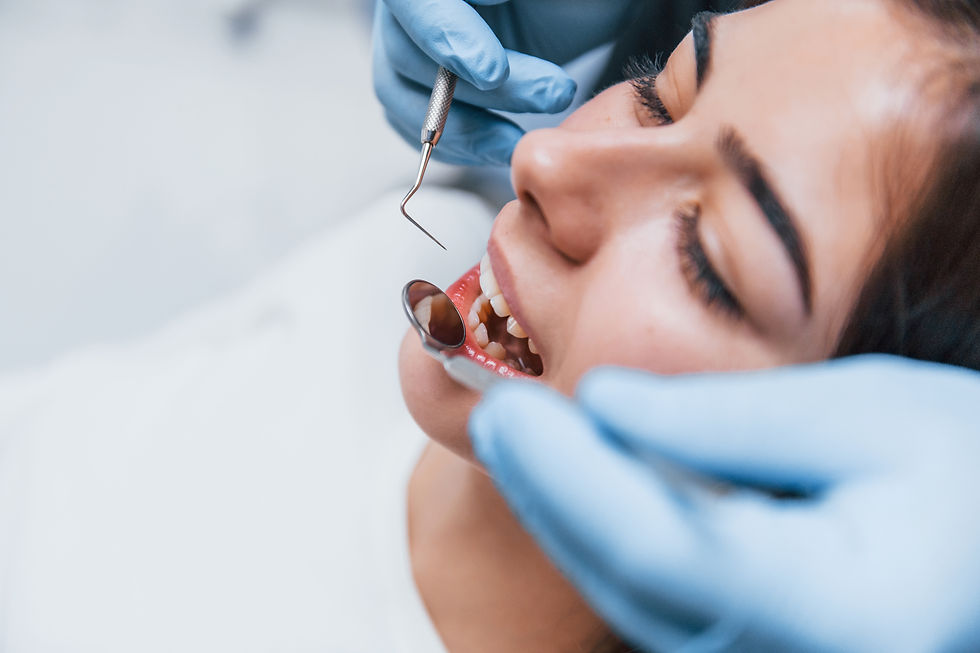- jeffreyjpham
- Feb 18
- 5 min read
Are you wondering when it might be time to remove your wisdom teeth, why the procedure is necessary, and how it all works? If you're experiencing pain or discomfort at the back of your mouth, it could be a sign that your wisdom teeth—also known as third molars—are causing trouble. Typically emerging in your late teens or early twenties, these teeth can lead to a range of oral health issues if they don’t come in correctly.
In this comprehensive guide, we'll walk you through everything you need to know about wisdom teeth removal in Homebush West. We’ll explain the signs that indicate removal might be necessary, discuss the reasons behind the procedure, and detail what you can expect during the process—from the initial consultation to recovery.
What is a Wisdom Tooth Removal?
Wisdom tooth removal is a surgical procedure performed to extract one or more wisdom teeth that are causing problems or are at risk of causing problems in the future. These teeth often become impacted, meaning they are unable to fully emerge through the gum line due to lack of space or obstruction by neighbouring teeth. In most cases, your wisdom teeth can cause teeth crowding.
As a result, impacted wisdom teeth can lead to pain, swelling, infection, and damage to surrounding teeth and bone if left untreated.

What are the Signs and Symptoms of Wisdom Teeth Issues?
Knowing the signs and symptoms of wisdom teeth problems is important for deciding if removal is needed. Here are some common indicators:
Persistent Jaw Pain. If you're feeling ongoing pain in your jaw, especially near your wisdom teeth, it could be a sign of trouble.
Swelling or Bleeding Gums. If the gums around your wisdom teeth are swollen or bleeding, it might be a sign that something's not right.
Bad Breath and Unpleasant Taste. If you're experiencing bad breath or an unpleasant taste in your mouth, your wisdom teeth could be to blame.
Headaches and Earaches. Wisdom teeth can sometimes cause headaches or earaches due to the pressure they put on surrounding areas.
Crowding or Shifting Teeth. Sometimes, wisdom teeth can cause crowding or shifting of nearby teeth, which can affect the alignment of your smile.
If you're experiencing any of these symptoms, it's a good idea to see a dentist to determine if wisdom teeth removal is necessary.
The Wisdom Teeth Removal Process
The thought of having your wisdom teeth removed may seem scary, but knowing what to expect can help alleviate any fears you may have. If you're wondering what happens during a wisdom tooth appointment with your dentist, here’s a closer look at the entire process, from the initial consultation to post-procedure care.
Consultation and Assessment
During your initial consultation, your Homebush West dentist will conduct a thorough examination, which may include X-rays, to assess the position of your wisdom teeth and determine the best course of action. Based on their findings, they'll discuss treatment options with you, which may include wisdom teeth removal.
Preparation for Wisdom Tooth Removal
Before the removal, your dentist will give you some instructions to follow. This might include fasting before the surgery and stopping certain medications, like blood thinners. It's also advisable to arrange for transportation home on the day of the procedure, as you may feel groggy or disoriented after being under anaesthesia.

The Wisdom Teeth Removal Procedure
In Homebush West, wisdom tooth removal is typically performed under local anaesthesia to numb the area and minimise discomfort. In some cases, sedation or general anaesthesia may be used for patients who experience anxiety or require more complex extractions.
During the procedure, your dentist will make an incision in the gum tissue to access the wisdom tooth and remove it from the socket. In cases of impacted wisdom teeth, the tooth may need to be divided into smaller pieces for easier removal. Once the tooth is extracted, the area is cleaned, and stitches may be placed to promote healing.
The entire procedure usually takes about 45 minutes to an hour, depending on the complexity of the extraction.
Wisdom Tooth Removal Recovery Process
After wisdom tooth removal, it's normal to experience some swelling, discomfort, and minor bleeding in the days following the procedure. Your dentist will provide you with detailed instructions on how to care for the extraction site and manage any discomfort during the recovery period. This may include:
Taking prescribed pain medication as directed
Applying ice packs to reduce swelling
Eating soft foods and avoiding hard, crunchy, or spicy foods
Avoiding strenuous activities and smoking
Practising good oral hygiene, including gentle brushing and rinsing with warm salt water
Most patients recover from wisdom tooth removal within a few days to a week. Although a full healing of the extraction site may take several weeks. It's crucial to attend follow-up appointments so your dentist can monitor your progress and address any concerns promptly.
Why Wisdom Tooth Removal is Important
While not all wisdom teeth require removal, it's often recommended to prevent potential oral health problems down the road. Some of the reasons why wisdom tooth removal is important include:
To prevent impaction
Impacted wisdom teeth can cause pain, infection, and damage to neighbouring teeth and bone. Removing impacted wisdom teeth can alleviate discomfort and prevent further complications.
To avoid crowding
Wisdom teeth can exert pressure on adjacent teeth as they try to erupt, leading to crowding or misalignment of the teeth. Removing wisdom teeth can help preserve the alignment of your smile and prevent the need for orthodontic treatment.
To prevent infection
Partially erupted wisdom teeth can create pockets where bacteria can accumulate, increasing the risk of infection and gum disease. Removing these teeth eliminates the source of infection and promotes better oral health.
Possible Complications and Risks
Sometimes, even though it's rare, there can be complications after wisdom tooth removal. One of them is getting an infection, but if you take good care of your mouth and follow your dentist's advice, you can lower the risk. Another rare but possible issue is nerve damage, which could cause temporary or permanent numbness in your lip, tongue, or chin. If you have any worries or problems after the procedure, make sure to let your dentist know right away.
Cost and Insurance Coverage
The cost of wisdom tooth removal in Homebush West can vary based on factors like how many teeth need to be removed and the complexity of the procedure. Before scheduling your appointment, it's a good idea to contact dental clinics to get an estimate of the costs involved. Dental insurance coverage for wisdom teeth removal varies, so it's essential to check your policy or speak with your provider to understand what's covered and what isn't.
At Henley Dental, payment plans and financing options are available to help make the procedure more affordable for you.

Choosing the Right Dentist in Homebush West
Finding the best dentist for your wisdom teeth removal is important for a smooth and comfortable experience. Start by looking up dentists in Homebush West and see what other people have said about them in reviews. Make sure to ask about their experience with wisdom tooth removal, too.
Don't forget to consider the location and accessibility of their dental practice – you want it to be convenient for you. To learn more about how to find the right dentist, here are some helpful tips to guide you.
If you have any questions or concerns about wisdom tooth removal in Homebush West or would like to schedule a consultation, give us a call on (02) 9763 7889 so we can help you get started.
We treat all our patients with the utmost care and compassion, especially with wisdom teeth removal.


Comments